北师大版(2019)选择性必修第一册:Unit 3 Conservation Lesson 3 Memories of Christmas课件-(21张ppt)
文档属性
| 名称 | 北师大版(2019)选择性必修第一册:Unit 3 Conservation Lesson 3 Memories of Christmas课件-(21张ppt) |
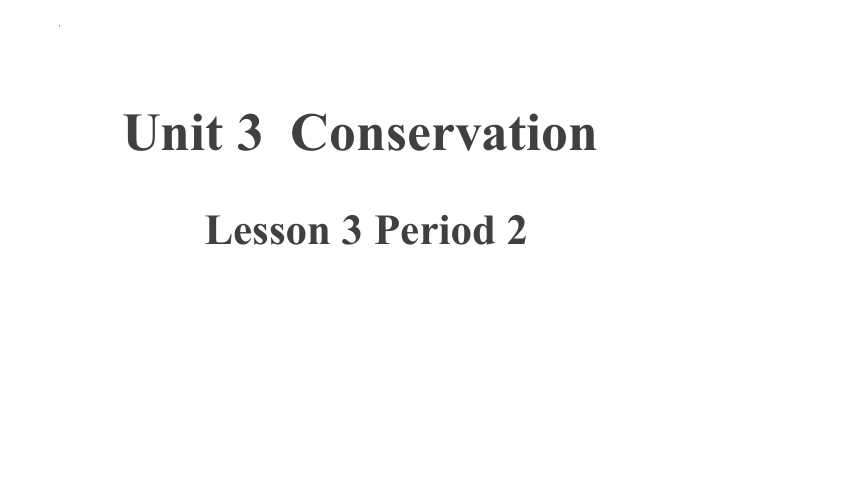
|
|
| 格式 | pptx | ||
| 文件大小 | 144.3KB | ||
| 资源类型 | 教案 | ||
| 版本资源 | 北师大版(2019) | ||
| 科目 | 英语 | ||
| 更新时间 | 2022-12-28 00:00:00 | ||
图片预览

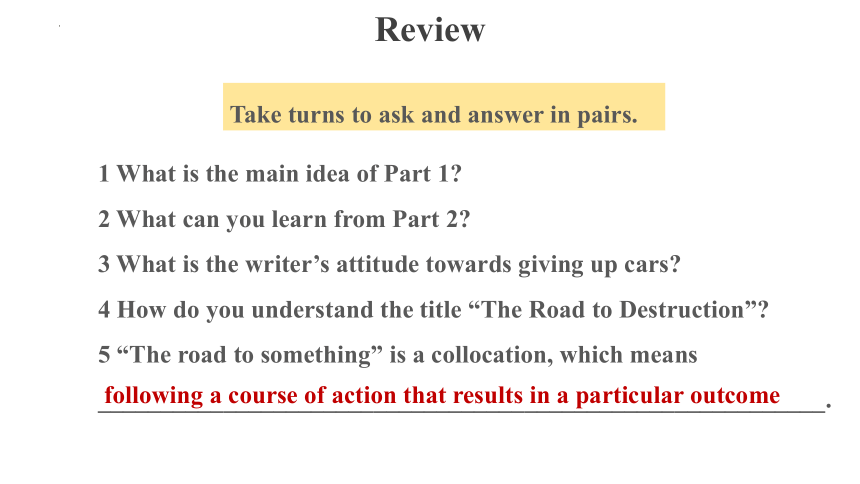
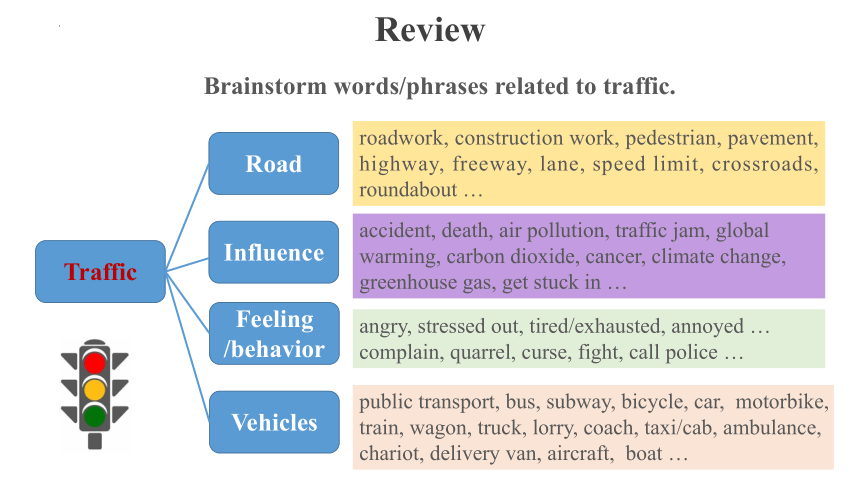
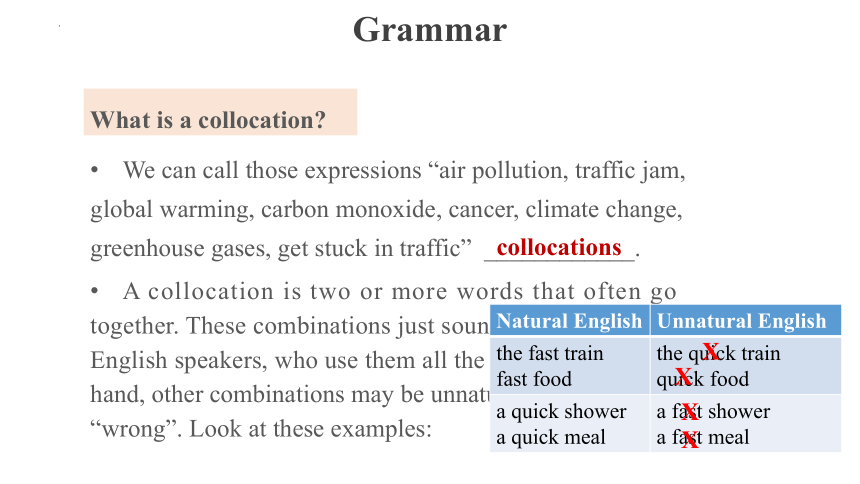
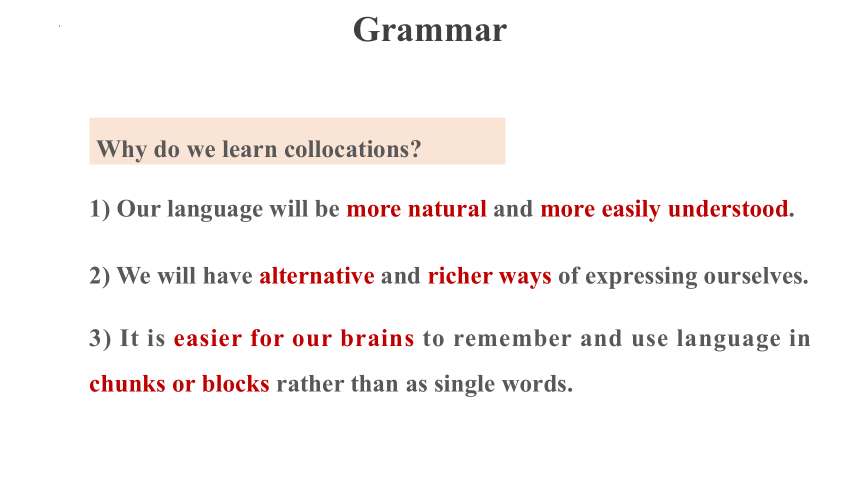
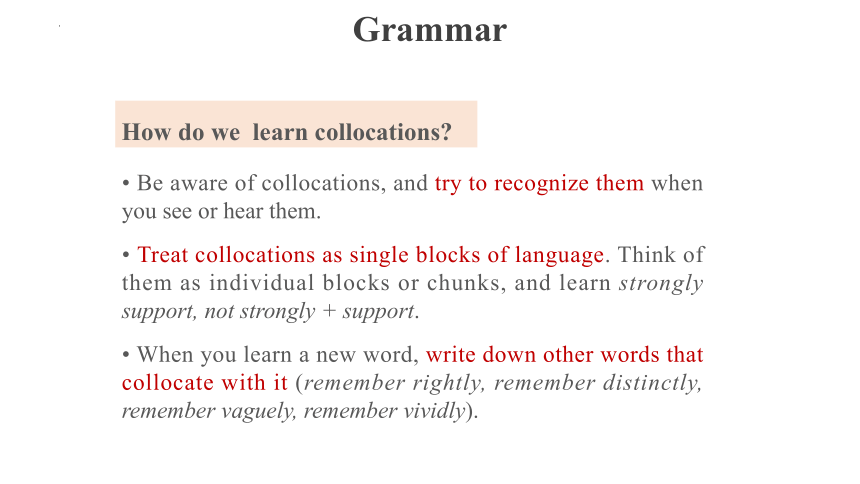

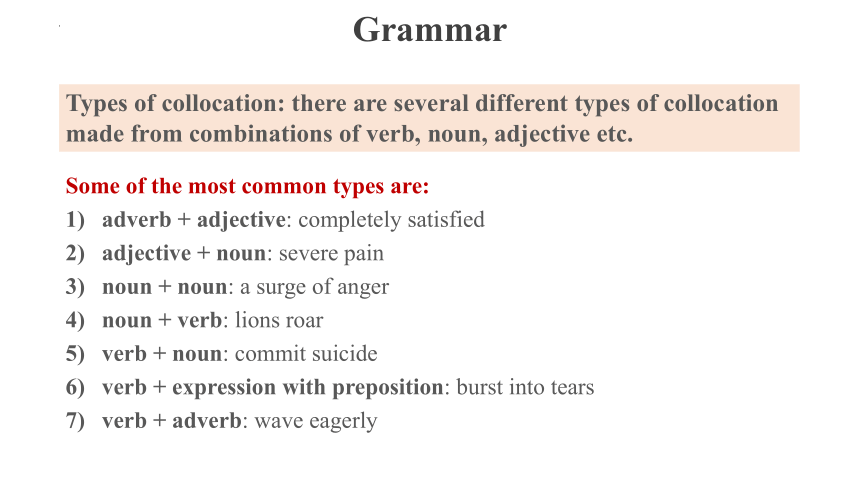
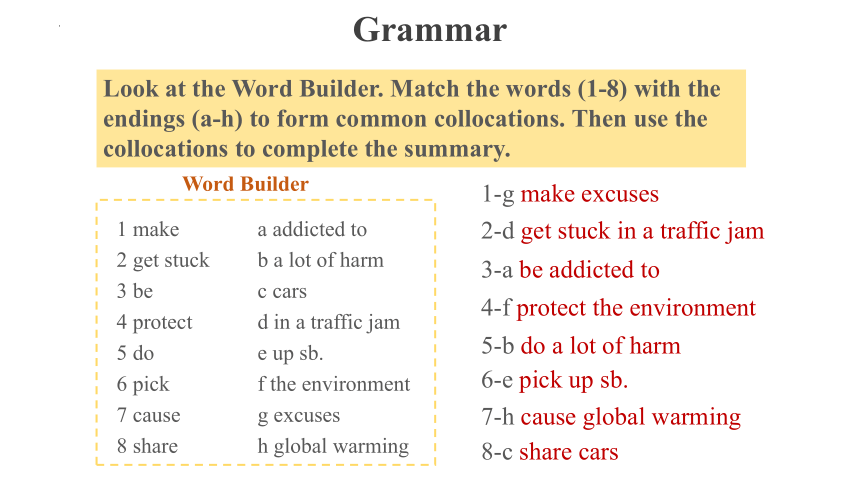
文档简介
(共21张PPT)
Unit 3 Conservation
Lesson 3 Period 2
Review
Take turns to ask and answer in pairs.
1 What is the main idea of Part 1
2 What can you learn from Part 2
3 What is the writer’s attitude towards giving up cars
4 How do you understand the title “The Road to Destruction”
5 “The road to something” is a collocation, which means
__________________________________________________________.
following a course of action that results in a particular outcome
Review
Brainstorm words/phrases related to traffic.
Traffic
Road
Vehicles
Influence
Feeling
/behavior
roadwork, construction work, pedestrian, pavement, highway, freeway, lane, speed limit, crossroads, roundabout …
accident, death, air pollution, traffic jam, global warming, carbon dioxide, cancer, climate change, greenhouse gas, get stuck in …
angry, stressed out, tired/exhausted, annoyed … complain, quarrel, curse, fight, call police …
public transport, bus, subway, bicycle, car, motorbike, train, wagon, truck, lorry, coach, taxi/cab, ambulance, chariot, delivery van, aircraft, boat …
Grammar
We can call those expressions “air pollution, traffic jam, global warming, carbon monoxide, cancer, climate change, greenhouse gases, get stuck in traffic” ____________.
collocations
What is a collocation
A collocation is two or more words that often go together. These combinations just sound “right” to native English speakers, who use them all the time. On the other hand, other combinations may be unnatural and just sound “wrong”. Look at these examples:
Natural English Unnatural English
the fast train fast food the quick train
quick food
a quick shower a quick meal a fast shower
a fast meal
Χ
Χ
Χ
Χ
Why do we learn collocations
1) Our language will be more natural and more easily understood.
2) We will have alternative and richer ways of expressing ourselves.
3) It is easier for our brains to remember and use language in chunks or blocks rather than as single words.
Grammar
How do we learn collocations
Be aware of collocations, and try to recognize them when you see or hear them.
Treat collocations as single blocks of language. Think of them as individual blocks or chunks, and learn strongly support, not strongly + support.
When you learn a new word, write down other words that collocate with it (remember rightly, remember distinctly, remember vaguely, remember vividly).
Grammar
Read as much as possible. Reading is an excellent way to learn vocabulary and collocations in context and naturally.
Revise what you learn regularly. Practise using new collocations in context as soon as possible after learning them.
Learn collocations in groups that work for you. You could learn them by topic (time, number, weather, money, family) or by a particular word
(take action, take a chance, take an exam).
You can find information on collocations in any good learner’s dictionary. And you can also find specialized dictionaries of collocations.
Grammar
Types of collocation: there are several different types of collocation made from combinations of verb, noun, adjective etc.
Some of the most common types are:
adverb + adjective: completely satisfied
adjective + noun: severe pain
noun + noun: a surge of anger
noun + verb: lions roar
verb + noun: commit suicide
verb + expression with preposition: burst into tears
verb + adverb: wave eagerly
Grammar
Look at the Word Builder. Match the words (1-8) with the endings (a-h) to form common collocations. Then use the collocations to complete the summary.
Word Builder
1 make
2 get stuck
3 be
4 protect
5 do
6 pick
7 cause
8 share
a addicted to
b a lot of harm
c cars
d in a traffic jam
e up sb.
f the environment
g excuses
h global warming
1-g make excuses
2-d get stuck in a traffic jam
3-a be addicted to
4-f protect the environment
5-b do a lot of harm
6-e pick up sb.
7-h cause global warming
8-c share cars
Grammar
Many people often 1_______________________ when they go to work. How annoyed and stressed they often feel! But the problem is that the number of cars is still going up. Traffic pollution has been found to 2____________________ and climate change to a large degree.
Too many cars 3________________ to the environment and our health. Some advice has been given for people to help 4 ________________________, for example, using public transport or 5 ____________, doing your shopping in the shop just around the corner instead of driving to the other side of town. However, people 6_________________ using cars. They 7 ______________ for using their cars, “I need to 8 __________ my daughter. What can I do ”
get stuck in a traffic jam
cause global warming
do a lot of harm
protect the environment
sharing cars
are addicted to
make excuses
pick up
Grammar
Decide which word, a or b, collocates in these sentences.
1 I ____ agree with everything you said.
a. whole-heartedly b. unconditionally
2 Doesn’t time ____ when you’re having fun
a. move b. fly
3 The leaders claimed the meeting had been ____.
a. fruitful b. prolific
4 Everyone got back safe and ____ after the storm.
a. soundly b. sound
Grammar
5 I think I’ve ____ weight since I stopped work.
a. accumulated b. gained
6 They’re building a new water ____ plant on the coast.
a. cleaning b. purification
7 House prices have ____ dramatically in recent months.
a. ascended b. soared
8 The disgraced former minister has decided to _________ politics altogether.
a. desert b. abandon
Grammar
Match the words or phrases on the left (1-8) with those on the right (a-h) to make collocations. Then complete the paragraph with the correct form.
1 heavy
2 share
3 get stuck
4 feel
5 keep
6 make
7 take
8 worry about
a a car
b such a long time
c stressed out
d traffic
e high levels of pollution
f excuses
g in a traffic jam
h fit
1-d heavy traffic
2-a share a car
3-g get stuck in a traffic jam
4-c feel stressed out
5-h keep fit
6-f make excuses
7-b take such a long time
8-e worry about high levels of
pollution
Grammar
I just hate getting to work in the morning. It 1____________________ to get to my office from my home because of the 2 ____________. Often I 3 _______
_____________ and I really 4 ______________. Last year, I tried to 5__________ with my colleagues who live near me but it still took so long. Now I go to work by train. To be honest, I really 6 _______________________________. It seems every year it is getting worse. I can’t understand why people always drive cars, even for a short journey when they could walk. Even though in recent years, the price of petrol goes up, people still 7____________ to use their cars. If your journey is less than 30 minutes, I really think the obvious solution is to walk. It will help you 8________ and be good to the environment.
takes such a long time
heavy traffic
get stuck
in a traffic jam
feel stressed out
share a car
worry about high levels of pollution
keep fit
make excuses
Grammar
break
Work out collocations with “break, catch, get, keep, pay and save” in groups.
catch
a habit
a leg
a promise
a record
a window
someone’s heart
the ice
the law
the news to someone
the rules
a ball
a bus
a chill
a cold
a thief
fire
sight of
someone’s attention someone’s eye
the flu
Grammar
get
keep
a job
a shock
angry
divorced
drunk
frightened
home
lost
married
nowhere
permission pregnant ready
started
the impression the message the sack
upset
wet
worried
a diary
a promise
a secret
an appointment
calm
control
in touch
quiet
someone’s place
the change
Grammar
pay
save
a fine
attention
by credit card
cash
interest
someone a compliment someone a visit
the bill
the price
your respects
electricity
energy
money
one’s strength
someone a seat someone’s life something to a disk space
time
yourself the trouble
Grammar
Use at least five of the following collocations
in a proper form to make up a short passage.
come from, be harmful to, feel annoyed, long distance, noise pollution, protect the environment, public transport, rely on, take action, traffic jams, worth the effort
Grammar
Example
A lot of people feel that driving their own cars allows them to have more freedom and they often complain about the inconvenience of public transport. Well, waiting time, crowds and sweating on public transport do leave people feeling annoyed, but in order to protect the environment, I think using public transport is worth the effort.
First of all, research shows that around 90% of total pollutants in some big cities come from cars. These pollutants are harmful to the environment and extremely dangerous to our health. They can damage our lungs and cause illnesses such as cancer. Relying too much on cars also creates problems such as traffic jams, road accidents and noise pollution. Of course, cars are convenient and necessary when travelling long distances, and for short journeys within the city it is often faster to cycle. So let us take action now.
Grammar
Assignment
Make a poster based on what you have learnt to encourage people in your neighborhood to use their vehicles wisely. Search for facts and data to make your poster convincing. Then share in groups/class.
Goodbye!
Unit 3 Conservation
Lesson 3 Period 2
Review
Take turns to ask and answer in pairs.
1 What is the main idea of Part 1
2 What can you learn from Part 2
3 What is the writer’s attitude towards giving up cars
4 How do you understand the title “The Road to Destruction”
5 “The road to something” is a collocation, which means
__________________________________________________________.
following a course of action that results in a particular outcome
Review
Brainstorm words/phrases related to traffic.
Traffic
Road
Vehicles
Influence
Feeling
/behavior
roadwork, construction work, pedestrian, pavement, highway, freeway, lane, speed limit, crossroads, roundabout …
accident, death, air pollution, traffic jam, global warming, carbon dioxide, cancer, climate change, greenhouse gas, get stuck in …
angry, stressed out, tired/exhausted, annoyed … complain, quarrel, curse, fight, call police …
public transport, bus, subway, bicycle, car, motorbike, train, wagon, truck, lorry, coach, taxi/cab, ambulance, chariot, delivery van, aircraft, boat …
Grammar
We can call those expressions “air pollution, traffic jam, global warming, carbon monoxide, cancer, climate change, greenhouse gases, get stuck in traffic” ____________.
collocations
What is a collocation
A collocation is two or more words that often go together. These combinations just sound “right” to native English speakers, who use them all the time. On the other hand, other combinations may be unnatural and just sound “wrong”. Look at these examples:
Natural English Unnatural English
the fast train fast food the quick train
quick food
a quick shower a quick meal a fast shower
a fast meal
Χ
Χ
Χ
Χ
Why do we learn collocations
1) Our language will be more natural and more easily understood.
2) We will have alternative and richer ways of expressing ourselves.
3) It is easier for our brains to remember and use language in chunks or blocks rather than as single words.
Grammar
How do we learn collocations
Be aware of collocations, and try to recognize them when you see or hear them.
Treat collocations as single blocks of language. Think of them as individual blocks or chunks, and learn strongly support, not strongly + support.
When you learn a new word, write down other words that collocate with it (remember rightly, remember distinctly, remember vaguely, remember vividly).
Grammar
Read as much as possible. Reading is an excellent way to learn vocabulary and collocations in context and naturally.
Revise what you learn regularly. Practise using new collocations in context as soon as possible after learning them.
Learn collocations in groups that work for you. You could learn them by topic (time, number, weather, money, family) or by a particular word
(take action, take a chance, take an exam).
You can find information on collocations in any good learner’s dictionary. And you can also find specialized dictionaries of collocations.
Grammar
Types of collocation: there are several different types of collocation made from combinations of verb, noun, adjective etc.
Some of the most common types are:
adverb + adjective: completely satisfied
adjective + noun: severe pain
noun + noun: a surge of anger
noun + verb: lions roar
verb + noun: commit suicide
verb + expression with preposition: burst into tears
verb + adverb: wave eagerly
Grammar
Look at the Word Builder. Match the words (1-8) with the endings (a-h) to form common collocations. Then use the collocations to complete the summary.
Word Builder
1 make
2 get stuck
3 be
4 protect
5 do
6 pick
7 cause
8 share
a addicted to
b a lot of harm
c cars
d in a traffic jam
e up sb.
f the environment
g excuses
h global warming
1-g make excuses
2-d get stuck in a traffic jam
3-a be addicted to
4-f protect the environment
5-b do a lot of harm
6-e pick up sb.
7-h cause global warming
8-c share cars
Grammar
Many people often 1_______________________ when they go to work. How annoyed and stressed they often feel! But the problem is that the number of cars is still going up. Traffic pollution has been found to 2____________________ and climate change to a large degree.
Too many cars 3________________ to the environment and our health. Some advice has been given for people to help 4 ________________________, for example, using public transport or 5 ____________, doing your shopping in the shop just around the corner instead of driving to the other side of town. However, people 6_________________ using cars. They 7 ______________ for using their cars, “I need to 8 __________ my daughter. What can I do ”
get stuck in a traffic jam
cause global warming
do a lot of harm
protect the environment
sharing cars
are addicted to
make excuses
pick up
Grammar
Decide which word, a or b, collocates in these sentences.
1 I ____ agree with everything you said.
a. whole-heartedly b. unconditionally
2 Doesn’t time ____ when you’re having fun
a. move b. fly
3 The leaders claimed the meeting had been ____.
a. fruitful b. prolific
4 Everyone got back safe and ____ after the storm.
a. soundly b. sound
Grammar
5 I think I’ve ____ weight since I stopped work.
a. accumulated b. gained
6 They’re building a new water ____ plant on the coast.
a. cleaning b. purification
7 House prices have ____ dramatically in recent months.
a. ascended b. soared
8 The disgraced former minister has decided to _________ politics altogether.
a. desert b. abandon
Grammar
Match the words or phrases on the left (1-8) with those on the right (a-h) to make collocations. Then complete the paragraph with the correct form.
1 heavy
2 share
3 get stuck
4 feel
5 keep
6 make
7 take
8 worry about
a a car
b such a long time
c stressed out
d traffic
e high levels of pollution
f excuses
g in a traffic jam
h fit
1-d heavy traffic
2-a share a car
3-g get stuck in a traffic jam
4-c feel stressed out
5-h keep fit
6-f make excuses
7-b take such a long time
8-e worry about high levels of
pollution
Grammar
I just hate getting to work in the morning. It 1____________________ to get to my office from my home because of the 2 ____________. Often I 3 _______
_____________ and I really 4 ______________. Last year, I tried to 5__________ with my colleagues who live near me but it still took so long. Now I go to work by train. To be honest, I really 6 _______________________________. It seems every year it is getting worse. I can’t understand why people always drive cars, even for a short journey when they could walk. Even though in recent years, the price of petrol goes up, people still 7____________ to use their cars. If your journey is less than 30 minutes, I really think the obvious solution is to walk. It will help you 8________ and be good to the environment.
takes such a long time
heavy traffic
get stuck
in a traffic jam
feel stressed out
share a car
worry about high levels of pollution
keep fit
make excuses
Grammar
break
Work out collocations with “break, catch, get, keep, pay and save” in groups.
catch
a habit
a leg
a promise
a record
a window
someone’s heart
the ice
the law
the news to someone
the rules
a ball
a bus
a chill
a cold
a thief
fire
sight of
someone’s attention someone’s eye
the flu
Grammar
get
keep
a job
a shock
angry
divorced
drunk
frightened
home
lost
married
nowhere
permission pregnant ready
started
the impression the message the sack
upset
wet
worried
a diary
a promise
a secret
an appointment
calm
control
in touch
quiet
someone’s place
the change
Grammar
pay
save
a fine
attention
by credit card
cash
interest
someone a compliment someone a visit
the bill
the price
your respects
electricity
energy
money
one’s strength
someone a seat someone’s life something to a disk space
time
yourself the trouble
Grammar
Use at least five of the following collocations
in a proper form to make up a short passage.
come from, be harmful to, feel annoyed, long distance, noise pollution, protect the environment, public transport, rely on, take action, traffic jams, worth the effort
Grammar
Example
A lot of people feel that driving their own cars allows them to have more freedom and they often complain about the inconvenience of public transport. Well, waiting time, crowds and sweating on public transport do leave people feeling annoyed, but in order to protect the environment, I think using public transport is worth the effort.
First of all, research shows that around 90% of total pollutants in some big cities come from cars. These pollutants are harmful to the environment and extremely dangerous to our health. They can damage our lungs and cause illnesses such as cancer. Relying too much on cars also creates problems such as traffic jams, road accidents and noise pollution. Of course, cars are convenient and necessary when travelling long distances, and for short journeys within the city it is often faster to cycle. So let us take action now.
Grammar
Assignment
Make a poster based on what you have learnt to encourage people in your neighborhood to use their vehicles wisely. Search for facts and data to make your poster convincing. Then share in groups/class.
Goodbye!
同课章节目录
- Unit 1 Life Choices
- Lesson 1 Lifestyles
- Lesson 2 Understanding and Coping with Stress
- Lesson 3 Your Life Is What You Make It
- Unit 2 Sports and Fitness
- Lesson 1 The Underdog
- Lesson 2 Rules of the Game
- Lesson 3 Running and Fitness
- Unit 3 Celebrations
- Lesson 1 Spring Festival
- Lesson 2 Special Occasions
- Lesson 3 Memories of Christmas
